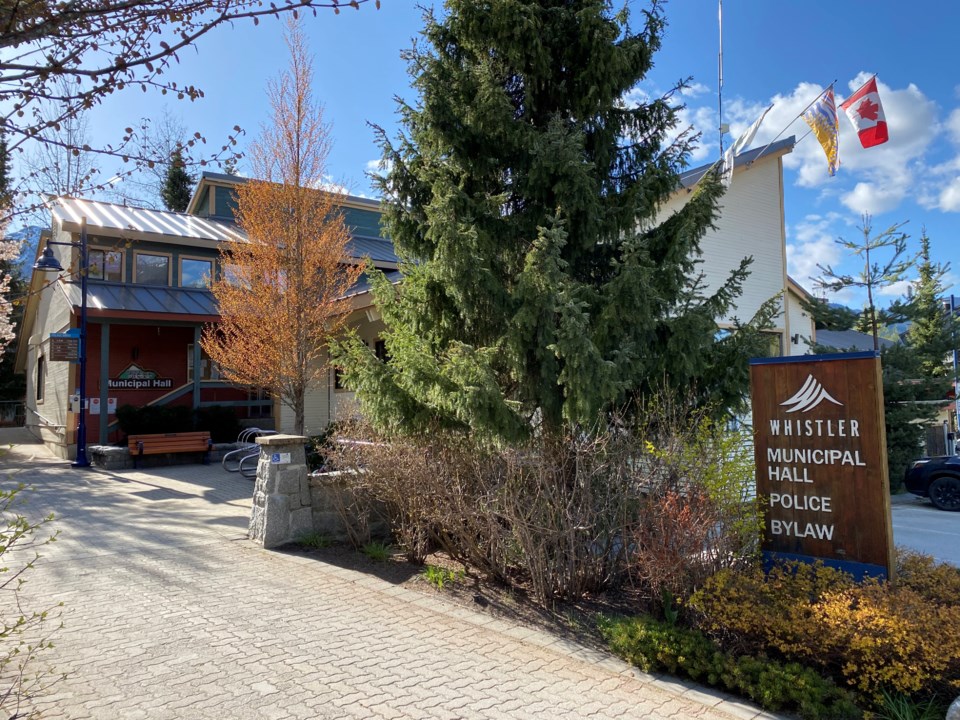Whistler's next mayor and council will see higher wages than their predecessors.
At its June 21 meeting, council adopted a new remuneration policy that will increase the wages of mayor and council as of Jan. 1, 2023.
Councillors' pay will rise from $41,313 to $48,798, a difference of $7,485, and the mayor's salary will rise from $105,300 to $128,903—an increase of $23,603.
Council remuneration is reviewed every four years, during the last year of the term of each council, and based off of wages in comparable communities.
For its purposes, the Resort Municipality of Whistler weighs itself against the City of North Vancouver, the City of Port Moody, the City of White Rock, the District of Maple Ridge, the City of Langley and the City of Port Coquitlam, which are determined to have similar daily populations, annual budgets and employee counts.
Salaries for elected officials in Whistler's comparable municipalities range considerably, from $107,760 for the mayor of North Vancouver to $153,675 for the mayor of Port Coquitlam.
Wages for councillors range from $42,931 in the City of Langley to $60,867 in the City of Port Moody. Whistler's new remuneration levels will put local elected officials in the middle of the pack.
Council also voted unanimously on June 21 to get rid of the $10,000 mayor salary cut resolution that has been in effect since 2011.
The mayor's salary raise recommended by staff was initially planned to be increased to $23,603 but factoring in the $10,000 cut, that was brought down to $13,603. By nullifying the 2011 resolution, future Whistler mayors will receive the full increase.
The $10,000 “mayor's haircut," as Councillor Ralph Forsyth called it, was brought in by past Whistler Mayor Nancy Wilhelm-Morden after she was elected in 2011. Forsyth brought forward the resolution to get rid of the salary reduction.
“The $10,000, that was a campaign promise from several elections ago and the mayor at the time said, 'I’m going to take a $10,000 pay cut,'" Forsyth said.
"Times have changed. The job has changed, and I think the next council can always change their minds, but if we take this step, I think it’ll be better moving forward."
Whistler councillors all agreed that the councillor job has increasingly become a full-time position as the resort municipality has grown and the time commitment for council has become considerable.
“This is going into effect in January of next year, and that's why this is easy to vote on, because this isn't about us giving ourselves a raise. We're not doing that right now. What we're doing is we're saying that this job is a tremendous amount of work, [the mayor job] is even more work,” said Coun. Jen Ford.
“Whoever steps up to take on this role needs to understand that this isn't something you do on the weekend off the side of your desk while you do another job ... Whatever we put in, we get out, and this is remuneration that allows people to do this job. It allows people who may not otherwise be able to step up and do this job as a volunteer role."
Whistler is a community of 14,000 with a daily population of 40,000, and $23 billion in assets, which present "huge complexities," said Coun. Arthur De Jong.
"And the mayor is the front face of operating the assets—It’s a very difficult job, and it's certainly shown through this term the crises that we've had to work through," De Jong said.
"So when I look at [the mayor's] wage, I find it very low, and I have absolutely no problem removing the haircut."
If you want to learn more about running for office, a candidate information session is taking place on June 28, held over zoom and in person at the Whistler Library.




